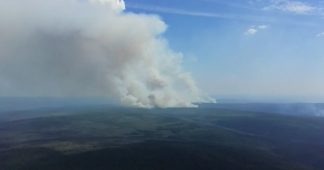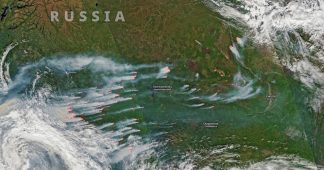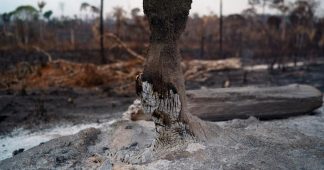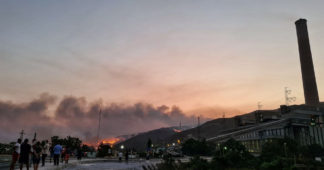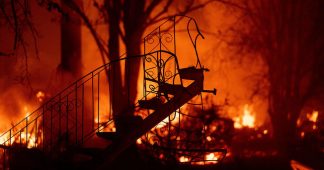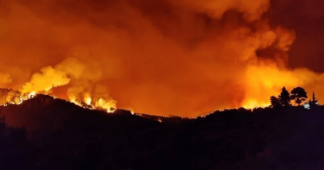Aug. 12, 2021
photo: Ivan Nikiforov / TASS
A wildfire raging in northeastern Siberia could become the largest in recorded history, experts from Greenpeace Russia told The Moscow Times on Wednesday.
The republic of Sakha (Yakutia), Russia’s largest and coldest region, has been devastated by unprecedented wildfires that are now larger than the rest of the world’s blazes combined. Residents have been under a state of emergency for weeks as thick, acrid smoke blankets settlements and reaches cities thousands of kilometers away, while thousands of volunteers have been recruited to fight the fires.
The largest of these fires has exceeded 1.5 million hectares in size, the Greenpeace environmental group’s forestry head Alexey Yaroshenko told The Moscow Times.
“This fire has to grow by about 400,000 hectares to become the biggest in documented history,” Yaroshenko said. “It is impossible to contain this fire through human efforts. … Firefighters would have to put out a line of fire 2,000 kilometers long.”
Only rain could stop or significantly slow down this fire, Yaroshenko said, but current rainfall is too weak to do so.
“In the best-case scenario we could save settlements and infrastructure that lies in the fire’s path,” he said.
Yaroshenko’s comments come days after a landmark United Nations climate report rang the alarm on global warming and called for more ambitious measures to prevent the climate from spiraling out of control.
Experts say Sakha’s fast-warming climate — the region has seen its annual average temperature rise by 3 degrees Celsius since the beginning of the 20th century — combined with a 150-year record drought and high winds has turned its vast taiga forest into a tinderbox.
Harmful forestry practices are a key factor behind the fires’ unprecedented spread, Greenpeace expert Yulia Davydova told The Moscow Times, as regional authorities aren’t required to extinguish fires in so-called “control zones” – areas far from human settlements. Logging, both illegal and legal, is another common cause, according to new data acquired by Greenpeace.
With weeks left to go in the wildfire season, the European Union’s Copernicus satellite monitoring service said that the Siberian forest fires have already emitted a record 505 megatons of carbon dioxide.
And satellite observations by NASA’s Earth-monitoring tool MODIS showed that smoke from the wildfires reached the North Pole for what is believed to be the first time in known history last week.
Nationwide, over 13.4 million hectares of land have been burned by wildfires — an area roughly the size of Greece — so far in 2021, Greenpeace says, citing official data
Published at www.themoscowtimes.com
